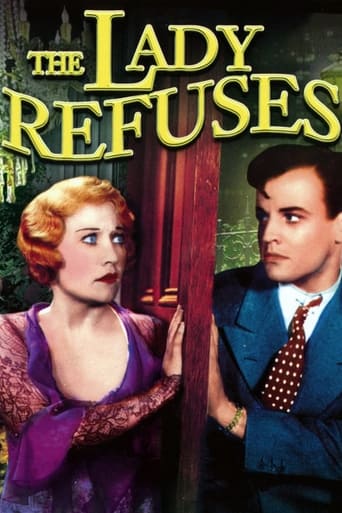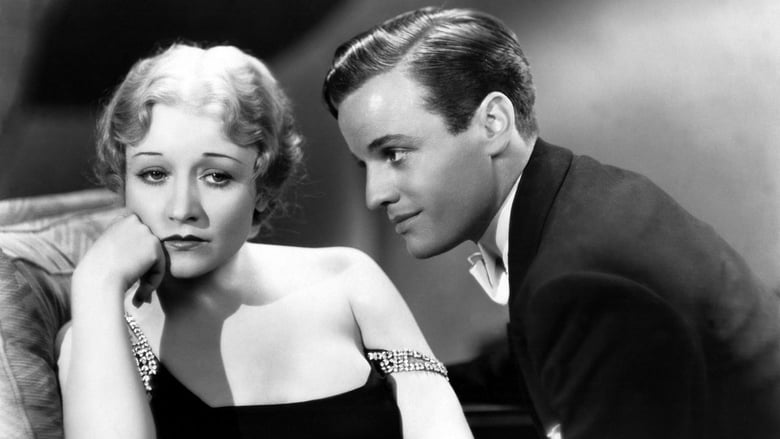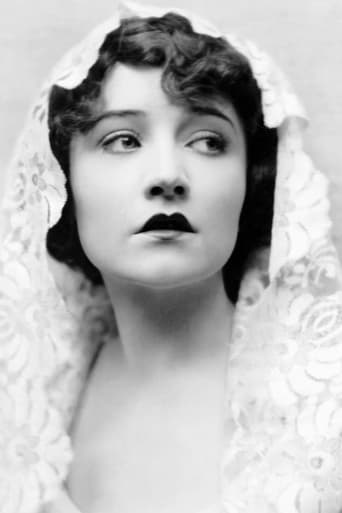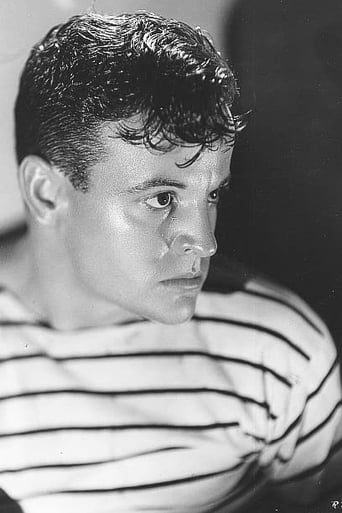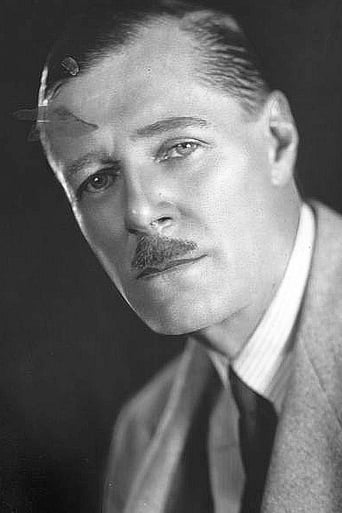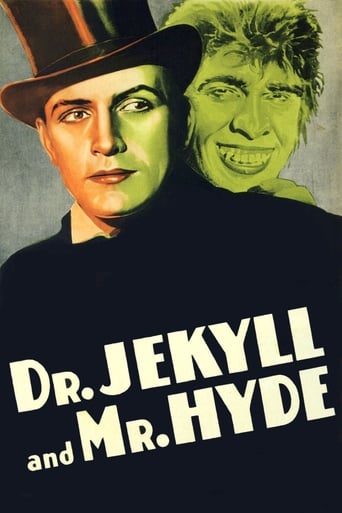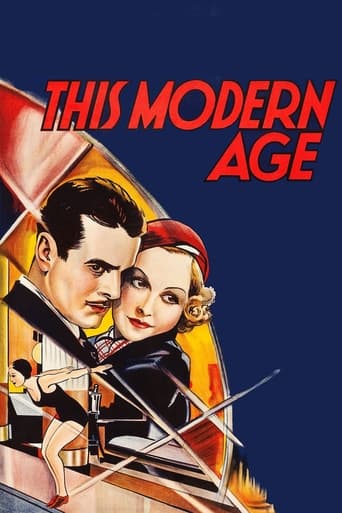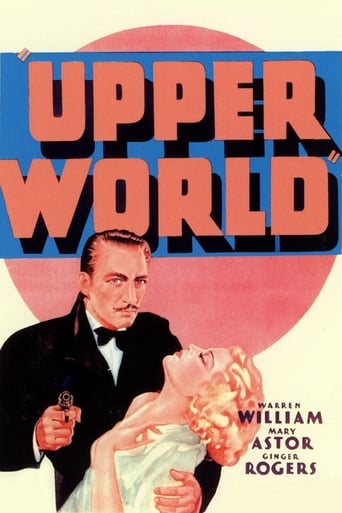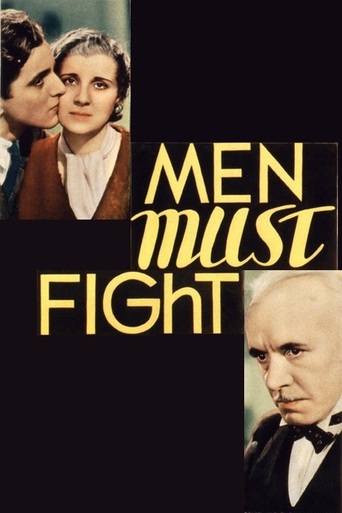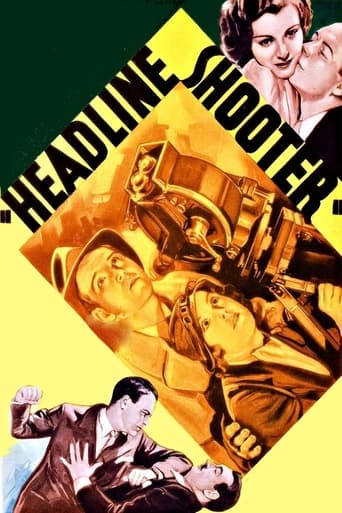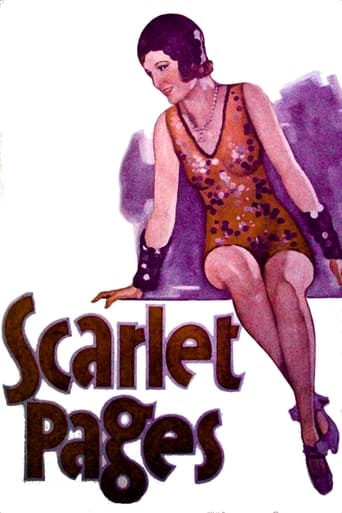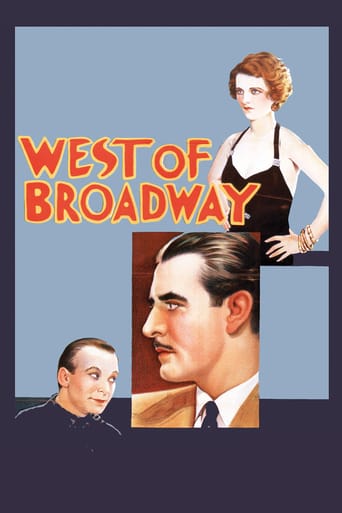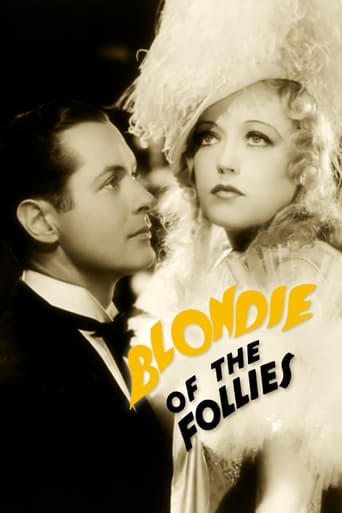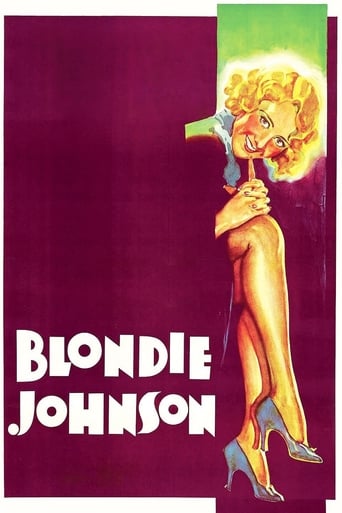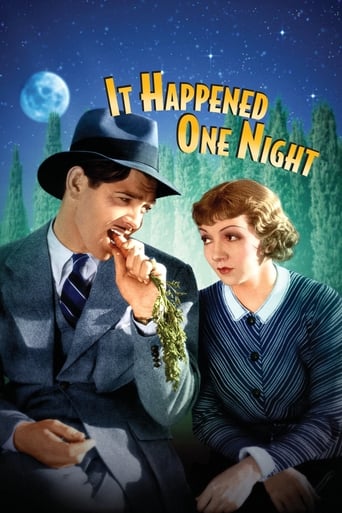The Lady Refuses (1931)
A wealthy London nobleman hires a pretty but poor young woman to distract his playboy son from marrying a golddigger. Complications ensue when the girl and the father begin to fall for each other, and things get even more complicated when the son declares his love for her, too.
Watch Trailer
Cast


Similar titles
Reviews
Best movie ever!
Although it has its amusing moments, in eneral the plot does not convince.
It's funny, it's tense, it features two great performances from two actors and the director expertly creates a web of odd tension where you actually don't know what is happening for the majority of the run time.
This movie feels like it was made purely to piss off people who want good shows
The tendency amongst early US talkies to have British settings where actors talked "English" (through anxiety about the comprehensibility of "American") was a great boon for all the English actors hanging around Hollywood but it produced some bizarre results. See also the improbable cockney criminal who leads a young Cagney astray in that wonderful film of the same year, The Public Enemy. Cagney, of course, was the living proof that one did not have to speak "English" or enunciate carefully (like his little mum in the same film) but it was while before the penny dropped with the ever-fearful US studios.In this film, set in London (and seemingly genuinely filmed there at least in part), an extremely British gentleman has a son who for some inexplicable reason has grown up to be a singularly unpleasant, ungentlemanly, fat-headed American of whom he is inordinately fond for no possible reason that one can imagine. Happening by chance upon a somewhat destitute, worse-for-wear American girl (of whom there were doubtless many walking and working the streets of London at the time), he employs her to wean his odious offspring from a lifestyle that seems more stupid than wicked and which is seemingly lived amongst an entire colony of Americans (plus one villainous Russian) that seems mysteriously to have installed itself in London. The woman (no chicken), to her credit, sensibly and unsurprisingly falls for the charming father rather than the gruesome son...but she would really have been a more suitable bride for the butler. Unfortunately this sensible resolution seems to occur to no one.....The film is almost as much nonsense as is all the rubbish talked about "pre-code" US films. Censorship existed in the US industry well before the Hays code and Hays had devised his code in the late twenties although it was true that it was only patchily enforced before about 1932 but the difference this made was really very slight. What changed rather more were social attitudes in the US, which became steadily more conservative and which resulted in much greater self-censorship. The whole "Hays" system was in fact a process of self-censorship and was of course always in the service of the industry. So the censorship that held sway between the thirties and the fifties (when it all started to fall apart) was really just a conspiracy between increasingly risk-avoiding studios and an increasingly conservative cinema-going public. But the application of that system was never anything but patchy and, even forgetting the burgeoning number of B-films and exploitation films that completely bypassed Hays and the mainstream circuit, the difference between "pre-code" and "post-code" that so many people like to see is really very largely in their own imagination. Just think for a moment of "post-code" films like Design for Living or Nothing Sacred or Detour and compare them with this supposedly "pre-code" load of twaddle and you will easily appreciate the point.....The most celebrated literary example of the good-hearted prostitute v hypocrisy was Somerset Maugham's story Sadie Thompson and this was filmed in 1928 but again in 1932 (as Rain) and again in 1946 with some variation and an all black cast by Spencer Williams (as Dirty Gertie from Harlem U.S.A.). Meanwhile it was turned into a Broadway musical (1944-45), parodied in the perfectly awful 1949 film Love Happy and then films in its turn by Curtis Bernhardt in 1952.Archainbaud was something of a hack but he was not incompetent. The Silver Horde the previous year, a sort of latter-day Klondike western based on a Rex ("The Spoilers") Beach novel, contains some excellent documentary-style footage of the salmon fisheries/canneries although I suspect this may owe a bit to the 1920 film of the same novel by Frank Lloyd (lost?). The earlier film also contains a much more believable and effective portrait of "that type of girl" (excellently played by Evelyn Brent).With respect to the gent from Sacramento, I think it must be Stephen Fry's performances that are "enhanced" by a similarity to Gilbert Emery rather than the other way round.
Betty Compson was one of the very few silent stars who's career kick started again at the dawn of the talkies. She had a few lucky breaks in her career - first "The Miracle Man"(1919) was her breakthrough to stardom, then when she was almost forgotten Josef von Sternberg came to her rescue with "The Docks of New York", lastly when talkies came in studio heads realised she could play the violin - and loved it in those gimmicky, singie, dancey days. That kept her afloat during the early 30s and she was kept busy with whatever type of genre they threw at her.This role suited her to a tee - she plays June, a girl down on her luck whose first night on "the game" has turned into a cat and mouse chase with two interfering bobbies!! She is saved by Gerald Courtney (Gilbert Emery) who wants to "hire" her as a decoy to lure his son Russell (John Darrow) away from bad booze and bad women - one Berthine (Margaret Livingston). He sees how well June fits into the gentry atmosphere and performs a "Pygmalion" act on her, clothing her from head to foot in the height of fashion.So June and Russell "meet" and she proves she can be a real pal to him so he soon forgets Berthine but June finds herself falling in love with his father and Gerald more than reciprocates!! All very complicated as of course Russell falls in love with her and the knowledge that not only has he been duped but his rival is his own father is enough to send him scuttling back to Berthine - and she is happy to oblige!! But Berthine has a jealous lover (Ivan Lebedeff) who has shown from the start that if she crosses him, she will never cross again and before you know it Russell is arrested for murder.The setting was London and Compson showed she had really soaked up the accents and atmosphere from her trips to England in the 1920s. John Darrow was a pretty poor actor who never escaped poverty row, Margaret Livingston had been a silent vamp ("Sunrise") whose career foundered in the talkies but she found lasting happiness as Mrs. Paul Whiteman!!
I saw this film on YouTube and was rather impressed by it. The adult themes of the interesting story held my attention, but what really sold me was, to me, the always-good Betty Compson, an actress whose heyday was in the silent films, and though she couldn't sing or dance, became quite popular in the early talkie days by virtue of the fact that she not only had a fine speaking voice, but she could really act. She's just fine playing the street girl with the heart-of-gold here, and the story and settings are good as well. If I can fault the production, it's in the fact that, despite being set in London, no one (save for Daphne Pollard) speaks with anything like a British accent. I chalk this up to it's "early talkie" status and the fact that, perhaps in those days, the producers weren't sure that a genuine British accent would go over with a "Yank" audience. The theme music over the opening and closing credits is "My Dream Memory", from Betty's 1929 picture, Street Girl. In that picture, Betty did her own playing on the violin of that song.
Talky early talkie can't rise above its theatrical roots. Betty Compson is far too old (36 when this movie was released) and American to pass herself off as a Londoner fallen on bad times who can be hired to seduce rakehell John Darrow (who seems to know better than to attempt an English accent). Gilbert Emery is best in a stiff-upper-lip performance enhanced by his remarkable vocal and physical similarity to Stephen Fry. But this tale of a woman saved from the London streets so she can save the son from making the wrong choice is marred by blurry details, as if most of the story has taken place out of frame. What story remains moves slowly, and holds tight to its stereotypes of upper classes, comic butlers, loose women, and sneering foreigners. For devotees of early talkies only.

